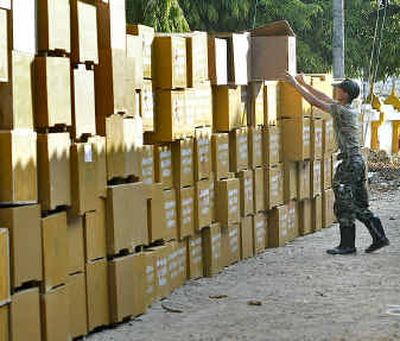Aid efforts focus on tourists

BAN NAM KHEM, Thailand – While foreign survivors of the ocean’s onslaught were put up in an international school complete with beds, TVs and Internet connections, Thais from a devastated fishing village slept outside, many without blankets, burning wood to keep warm and keep mosquitos at bay.
The locals said Friday that they are torn between wanting to help the foreigners, who are the lifeblood of the area’s economy, and getting what they can from the relief effort.
“No one came to help, we just helped each other out,” said 65-year-old Yokhin Chuaynui, whose home in Ban Nam Khem was destroyed. “When injured Thais went to the hospital, if they weren’t about to die they helped the Westerners first.”
The contrast is sharpest in Thailand, where wealthy tourist resorts brush up against shanty fishing villages, but all around the Indian Ocean there have been reports of local people feeling ignored or insulted by the meager aid that has trickled to them since Sunday.
Shortly after the seawater subsided from exclusive resorts and palm-fringed beaches of southern Thailand, authorities began setting up makeshift embassies, providing free phones and food to tourists. Hotels and an international school that survived relatively unscathed opened their doors to shellshocked tourists, while foreign governments provided evacuation flights.
But Wimol Thongthae said there was no help at all the first day in Ban Nam Khem, where he said more than 2,000 people – half the village – had disappeared. Eight of his 15 family members remain missing – including his 3-year-old daughter.
“I’m living without hope and have not received any assistance,” he said.
Deputy Agriculture Minister Newin Chidchob, overseeing the rescue effort at Ban Nam Khem, insisted the government had not ignored their plight.
“We do not abandon them. Everybody has tried their best,” he said as authorities pumped water out of streets. “If it is not fast enough in the villagers’ eyes, it just could not be helped because the situation is so severe.”
In Sri Lanka, some people complained that helicopters that could have brought supplies to devastated villages instead were used to rescue high-profile survivors.
One early flight evacuated former German Chancellor Helmut Kohl and his entourage, who were vacationing in southern Sri Lanka.
In India, survivors complained of feeling insulted by piles of secondhand clothes dumped at roadsides for them.
At a makeshift relief camp for women inside a marriage hall in the southern coastal city of Nagappattinam, refugees grumbled about the perceived condescending attitude of relief workers.
The city was hit hardest by the wall of water, accounting for more than half of India’s official death toll of more than 7,700 people.
“We have been insulted so much that we don’t want any aid from anybody,” said 35-year-old Lakshimi, who goes by only one name. “We are prepared to die.
“They bring food for a few hundred people to a place where thousands of people are sheltered. … We have never looked for alms from anybody, now we have been reduced to beggars.”
Robert Eunson, 52, from Yorkshire, England, said that “the greatest need should be given the greatest care,” but he acknowledged there was an element of self-interest in Thai authorities’ rush to help foreigners.
“Tourism is so important to them so it’s a hierarchy,” he said.
Jeanette Dombrowe, 32, a German native who has lived for years on the Thai island of Koh Payam, agreed.
“The villagers are second-class victims, but if we don’t look after the Westerners the nation could lose its tourism – so the villagers have to understand,” she said.